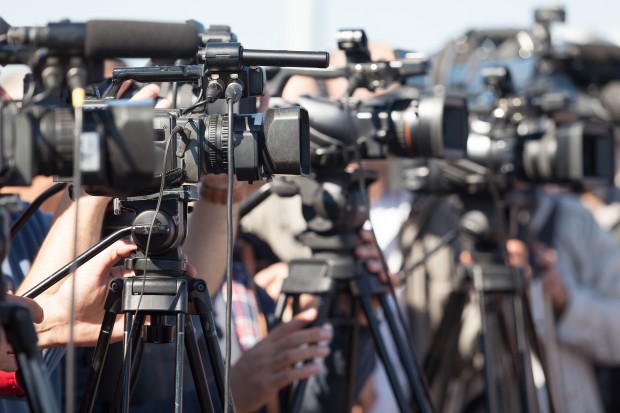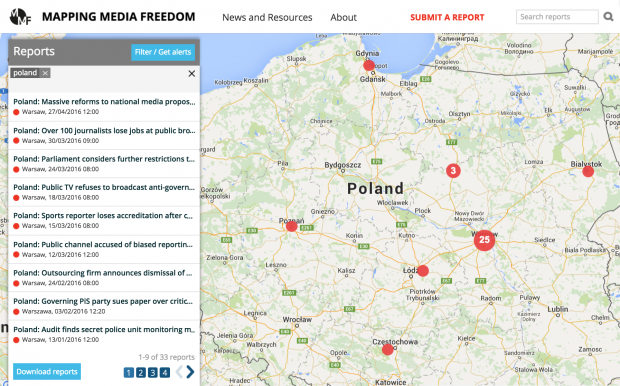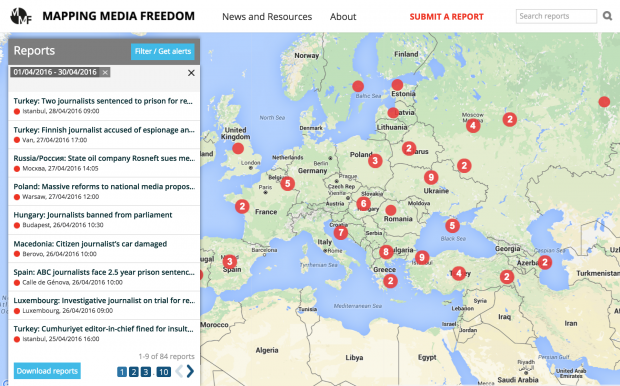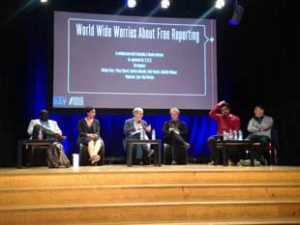18 May 2016 | Bosnia, Europe and Central Asia, Mapping Media Freedom, mobile, News, Russia, Turkey, United Kingdom

Each week, Index on Censorship’s Mapping Media Freedom project verifies threats, violations and limitations faced by the media throughout the European Union and neighbouring countries. Here are five recent reports that give us cause for concern.
The Russian state media regulator Roskomnadzor began blocking Krym Realii, the Сrimean edition of Radio Free Europe / Radio Liberty on Saturday 14 May.
A representative of Roskomnadzor confirmed that the regulator had blocked a page, which contains an interview with a leader of the Tatar Mejlis, at the request of the general prosecutor office. “Currently, Roskomnadzor is implementing measures for blocking and closing this website,” criminal prosecutor Natalia Poklonskaya told Interfax.
Krym Realii was established following the annexation of Crimea to Russia. Materials on the site are published in Russian, Ukrainian and Crimean Tatar languages.
Several editors at RBC media holding lost their jobs on 13 May following a meeting between top management with journalists. They include RBC editor-in-chief Elizaveta Osetinskaya, editor-in-chief of the RBC business newspaper Maksim Solyus, and RBC deputy chief editor Roman Badanin.
In a press release, RBC underlined that the dismissals were finalised as a mutual agreement of both parties, but sources from TV-Dozhd and Reuters claim managers have bowed to political pressure from the Kremlin.
The pressure against RBC began following investigations that have reportedly “irked the Kremlin“, including one on the assets of Vladimir Putin’s alleged daughter, Ekaterina Tikhonova.
Petar Panjkota, a journalist for the Croatian commercial national broadcaster RTL, was physically assaulted after he had finished a segment from the Bosnian town Banja Luka on 14 May.
Panjkota was reporting on parallel rallies in Banja Luka, the administrative centre of Bosnia’s Serb-dominated of Republika Srpska. He was reporting on protests organised by the ruling and opposition parties of the Bosnian Serbs. When he went off air, Panjkota was punched in the head by an unidentified individual, leaving bruises.
RTL strongly condemned the attack, calling it another attack on media freedom. No information has surfaced on the identity of the assailant.
On 12 May, the long-awaited white paper on the future of the BBC was unveiled. The BBC Trust is to be abolished and replaced by a new governing board including ministerial appointees. The board will be comprised of 12 to 14 members: the chair, deputy chair and members for each of the four nations of the UK will be appointed by the government and the remaining seats will be appointed by the BBC.
“It is vital that this appointments process is clear, transparent and free from government interference to ensure that the body governing the BBC does not become simply a mouthpiece for the government,” Jodie Ginsberg, CEO of Index on Censorship, said.
“Independence from government is essential for the BBC and these proposals don’t quite offer that,” Richard Sambrook, director of the Centre for Journalism at Cardiff School of Journalism, Media and Cultural Studies and former BBC journalist, told Index on Censorship. “There is no reason the board can’t be appointed by an arms length, independent panel. Currently the plans are too close to a state broadcasting model.”
Two reporters working for Dicle News Agency (DİHA) reporters were detained in the eastern city of Van on 12 May. Nedim Türfent and Şermin Soydan were allegedly detained within the scope of an on-going investigation and taken to the anti-terror branch in the central Edremit district of Van.
Both were detained separately. According to Bestanews website, Nedim Türfent was detained when his car was stopped by state forces at the entrance of Van. Şermin Soydan was detained on her way to cover news in the city of Van.
9 May 2016 | Europe and Central Asia, Mapping Media Freedom, mobile, News, Poland

There’s no doubt that Poland’s media landscape is undergoing a rapid transformation. The country’s ranking in the Reporters Without Borders’ World Press Freedom Index plunged from 18 in 2015 to 47 in 2016. The government rushed through a law in the waning hours of 2015 that gave it oversight of the nation’s public broadcaster. Scores of veteran journalists have lost their jobs.
Further changes may be on the way as new media legislation, the so-called “big media law”, is being debated and proposals have been floated to restrict how journalists report from inside the Sejm.
Poland has been all about the “good change” since November 2015. The phrase goes back to a campaign video produced in May 2015 for the Law and Justice (PiS) party’s Andrzej Duda. The party went on to win the October 2015 elections and Duda became the sixth president of Poland.
Since the election, “good change” has been co-opted on Twitter as #dobrazmiana by critics opposed to the government’s legislation, which, in the case of the public broadcasters, is being implemented by Krzysztof Czabański, a former journalist and minister for culture and national heritage.
As part of the changes, a total of 141 journalists have been dismissed, forced to resign or transferred to lesser positions between the election and May 2016, according to journalist union Towarzystwo Dziennikarskie (TD). The “small media law” passed in late December 2015 meant the replacement of the managing board of public broadcasters TVP and Polskie Radio, which started a top-down dismissal process that is still ongoing.
Among the first wave of dismissals was Tomasz Lis, a TVP presenter who hosted a talk show and was a winner of the annual Hyena of the Year, an anti-prize for unreliability and disregard for the principles of journalistic ethics. The prize is awarded by the journalist union Stowarzyszenie Dziennikarzy Polskich (SDP), which is generally rather supportive of PiS. Teresa Bochwic, a member of the SDP management board, expressed a characteristic view in her assessment of the “good change”: “For better or for worse, the lying propaganda has stopped for good. On TV, there is regular information and pluralistic current affairs. Pro-governmental? Perhaps even sometimes pro-governmental, but at least not deceitful.”
Even among the sympathetic SDP, however, PiS’ moves towards increased restriction on the movement of journalists and the dismissal of Henryk Grzonka from Radio Katowice, where he had worked for almost 30 years and had recently served as editor-in-chief, has raised concerns.
TD, the youngest of Poland’s journalist unions, was founded in 2012 out of the realisation that “in journalism, we can no longer be together”, according to co-founder Seweryn Blumsztajn.
In an interview with Index on Censorship, TD co-founder Wojciech Maziarski said that the recent dismissals have the character of “political cleansing”, which started progressively from the top, and then moved gradually to the lower ranks of what he considers to be state media.
“The ones to bite the bullet first were journalists and editors of news and current affairs programmes, as they…have the biggest influence on public opinion,” he said.
“The state media is intended to shape citizens of the new, right-wing Poland, which means that gradually, all will be replaced who are associated with liberal thought, feminism, left-wing ideas, even if they don’t engage directly in topical political debates,” Maziarski added.
Apart from Lis and several other well-known personalities, dismissals included Dariusz Łukawski, vice-chair of the journalist section of TVP2, and lead correspondent Piotr Krasko at TVP1’s main news outlet Wiadomosci.
Later, the axings reached media workers from various programmes and ranks, which could also explain more recent dismissals or transfers in regional branches of the public TV and radio broadcasters. Throughout March and April, more cases emerged: Marta Bobowska from TVP Opole had to put down her work and leave mid-day on 12 April; and Wojciech Biedak, editor at Poznan’s Polskie Radio affiliated Radio Merkury.
According to Maziarski, the number of dismissals shows that state authorities view the media as “a frontline in a political war – and this line has to be stacked with trusted and tried soldiers”, which necessitates the exclusion of “not only critical journalists but everyone who thinks independently”.
This may have been the issue for TVP Info editors Izabela Leśkiewicz and Magdalena Siemiątkowska, who were dismissed from their posts in mid-March immediately after a dispute with station management. Leśkiewicz and Siemiątkowska disagreed with the portrayal of the anti-PiS NGO the Committee of Democratic Defence (KOD) in a segment to be aired. KOD was founded following PiS’s electoral success in late 2015 and has since been actively rallying public opinion to protest government policy around the country.
Monitoring body KRRiT has repeatedly accused TVP of bias in its reports on the civil society organisation. The day before another KOD demonstration, the managing board of TVP Info decided it would not air a live broadcast of the beginning of the march, and specific narratives on “how KOD is hating on normal citizens” would be shown instead. Leśkiewicz and Siemiątkowska were dissatisfied with this and offered an alternative, more nuanced programme set-up. TVP Info management then fired the pair. Two other TVP journalists, Agata Całkowska and Łukasz Kowalski, resigned in protest.
Currently, new media legislation is being considered in parliament. This draft law would amount to a structural and financial overhaul of the public broadcaster. Under the draft, heads of the new “national media” outlets would be “appointed by a six-person National Media Council elected by the lower house of parliament, the Senate and the president for a six-year term” with one of the council slots legally guaranteed for the largest opposition caucus, according to Radio Poland. The proposed law would also replace the current license fee with a monthly “audiovisual” charge added to Poles’ electric bills beginning in January 2017.
Unlike Poland‘s three other journalists’ unions, Towarzystwo Dziennikarskie is boycotting the draft media law consultation being conducted by the minister for cultural affairs. Maziarski explains the union’s standpoint: “A big problem for public media in Poland is their financing. The introduction of a general audio-visual fee has been one of the main demands of the journalist environment. However, the fee introduced through the proposed law is intended to serve the maintenance of an indoctrination machinery and the PiS propaganda rather than public media. In effect, public media in Poland have ceased to exist.”
6 May 2016 | Belarus, Europe and Central Asia, Macedonia, Mapping Media Freedom, News, Russia, Turkey, Ukraine

April 2016 was the busiest month for Index on Censorship’s Mapping Media Freedom since the project began in May 2014, with a total of 87 violations against the media recorded. While MMF records violations from over 40 countries, the majority (55%) of last month’s violations came from just five countries.
These hotspots for attacks on the media will come as no surprise to anyone following the project in recent months.
Turkey continues to be the worst offender
With 16 violations recorded within its borders in April, Turkey is again the location with the most offences.
One of the most worrying occurrences last month was on 28 April when journalists Ceyda Karan and Hikment Chetinkaya, who work for Turkish daily Cumhuriyet, were sentenced to two years in prison for publishing the cover of Charlie Hebdo magazine featuring an image of prophet Muhammad. The pair were convicted of inciting “hatred and enmity”.
In another instance, on 30 April, Hamza Aktan, news director of private Istanbul-based IMC TV, was arrested by anti-terror police. Aktan was escorted to the police station where he was interrogated for 12 hours and then released. The editor is being accused of spreading propaganda for a terrorist organisation and trying to build public opinion abroad against interests of Turkey for four public tweets.
UPDATE: Government-seized Zaman and Cihan forced to close
Index on Censorship’s latest quarterly report includes a case study on an Istanbul court appointing a group of trustees to take over the management of Zaman newspaper. Since the report, it has been announced that Zaman and Cihan News Agency, also government-seized,
are to be permanently closed on 15 May. The decision comes the day after the European Commission recommendation of granting Turkey visa-free travel to the EU.
Russia: Big business throws its weight around
As the Panama Papers showed in April, investigative journalism is essential if misconduct and abuse by big business are to come to light. This makes a recent trend in Russia all the more worrying.
A total of 12 reports were filed in Russia last month, three of which related to journalists investigating business. On 12 April, when covering truckers protesting against the “illegal” actions of Omega, journalist Anton Siliverstov’s phone was stolen by Evgeni Rutkovski the director of the transport company. When he asked Rutkovski to comment on the protest, Siliverstov was forced from the office. The journalist said he would record the incident on his phone, at which point Rutkovski snatched the journalist’s device, refused to give it back and called security. Siliverstov hasn’t seen the phone since.
Two days later, reporter Igor Dovidovich was assaulted by the head of Gaz-Service, a gas company he was investigating. His TV crew was also attacked by the firm’s employees.
The month ened with state oil company Rosneft filing a judicial complaint against BiznessPress for an article which, the firm said, is “false and represents baseless fantasies of journalists or their so-called sources”.
Ukraine: TV journalists in the firing line
Ukraine continues to be unsafe for many media workers, with nine reports submitted to the project in April. Violations included five cases of intimidation, two attacks to property and several physical assaults. On 1 April, unidentified assailants set a local TV studio on fire with molotov cocktails. Studio equipment and furniture were destroyed. No one was injured.
Three days later, claims emerged that journalists working for TV channel 1+1 were under surveillance, have received death threats and have been assaulted. Later in the month, journalists from the station were attacked on 19 and 20 April.
Belarus: Journalism as a crime
Journalism is not a crime, but you’d be excused for thinking otherwise when observing recent events in Belarus. Seven reports were filed for Belarus last month, including two criminal charges resulting in fines, three arrests, and one journalist interrogated for doing his job.
On 15 April, freelance journalists were fined approximately €330 each for contributing to Polish TV channel. Kastus Zhukousky and Larysa Schyrakova were found guilty of illegal production and distribution of media products and for contributing to a foreign media outlet without accreditation.
Zhukouski has been fined seven times this year alone.
Macedonia: Anti-government protests turn sour
Six reports were submitted from Macedonia during April. The most worrying instances involved attacks to property (2) and a physical assault, leading to an injury.
April saw a wave of anti-government protests with thousands marching, mainly peacefully, through the capital city of Skopje. On 13 April four photographers and one journalist were injured by police during the anti-government demonstration. Two TV journalists were also injured by demonstrators on the day. On 14 April the offices of the Slobodna Makedonija radio station were pelted with stones by some anti-government demonstrators, causing the windows to break and other material damages.
Mapping Media Freedom Quarterly Report
Index on Censorship has released its report for the first quarter of 2016 covering 1 January and 31 March 2016. During this time: Four journalists were killed; 43 incidents of physical assault were confirmed; and there were 87 verified reports of intimidation, which includes psychological abuse, sexual harassment, trolling/cyberbullying and defamation. Media professionals were detained in 27 incidents; 37 criminal charges and civil lawsuits were filed; and media professionals were blocked from covering a story in 62 verified incidents.
“Conflict in Turkey and eastern Ukraine along with the misuse of a broad range of legislation — from limiting public broadcasters to prosecuting journalists as terrorists — have had a negative effect on press freedom across the continent,” Hannah Machlin, Mapping Media Freedom project officer, said.
5 May 2016 | Belgium, Europe and Central Asia, Mapping Media Freedom, News

L-R Antoine Kaburahe, Melody Patry, Jean-Paul Marthoz, Thierry Chervel, Abdualla Maksour and Rudi Vranckx discuss world wide worries about free reporting
This week’s Difference Day conference in Brussels was all about celebrating press freedom. “Should we instead mourn press freedom?” asked Jean-Paul Marthoz, EU correspondent for the Committee to Protect Journalists.
Journalists and media professionals from across the world attended the World Press Freedom Day event at the Bozar Centre for Fine Arts on 3 May.
Marthoz was joined at the World Wide Worries About Free Press debate by Index on Censorship’s senior advocacy officer Melody Patry, journalist Thierry Chervel, founder and director of Burundi-based newspaper IWACU Antoine Kaburahe, conflict journalist Rudi Vranckx, and Syrian journalist and novelist Abdualla Maksour.
Patry drew attention to the work of those who fight to protect press freedom. She said although she can understand the position of “pessimists among us today”, having “a day to celebrate journalism and the free press already shows that we are attached to the idea that we need to support and protect the standards of journalism across the world, and highlight the work of journalists who are imprisoned and even killed for reporting the news”.
Conflict journalist Rudi Vranckx was less optimistic. He told of how every translator he worked with in Iraq, Syria, Gaza and Egypt has since been forced to flee their home.
Vranckx’s concerns were shared by Maksour who, holding a sign with the Aleppo is burning hashtag, highlighted the situation in Syria, stating that 15 civilians had died there on that morning alone.
“You can’t find a foreign journalist out there because it is very dangerous – they will be arrested or be killed,” said Maksour, adding that the situation prevents us from seeing the real picture of what is going on in Syria.
In an earlier debate, EU Media, Censorship and Propaganda, Patry introduced Index on Censorship’s Mapping Media Freedom project and took part in a discussion with Marthoz, Jakub Kalensky of the East StratCom Task Force and Maria Donde, Ofcom’s international policy manager.
The debate focused on ways to counter propaganda with information that is readily and safely available for anyone, so that people can make up their own mind.
“People, of course, should have access to as wide a range of information as possible, but what’s continually important is for them to have critical understanding to be able to tell the difference between a fabricated, exaggerated, poorly sourced story and what is a credible news source,” Donde said.
Patry, agreeing with Donde, suggested people shouldn’t necessarily believe everything they see on the TV. “Journalists doing a good job, verifying sources, and verifying information is also part of improving the wider environment for press freedom and pluralism in Europe,” she added.
Difference Day showed that press freedom never comes without challenges. It may be time to ask ourselves seriously: is it time to mourn or celebrate?




